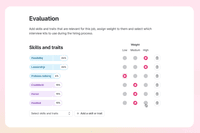

Scott van Dort
As Senior Copywriter at Teamtailor, my goal is to communicate, inform, educate, and inspire existing and potential users about our incredible, all-in-one recruitment solution.
There’s no underestimating the impact that one great hire can have on your business.
But knowing how to evaluate candidates properly is often trickier than it seems.
As we’ll explore in this article, finding the right hire is not only better but ultimately cheaper. This is where quality of hire (QoH) comes in.
Recruitment: Quality vs Quantity
But first, what is meant by "quality of hire"? In short, it’s about how much value a new employee brings. It’s not just about ticking off boxes for skills and experience; it’s about how well they mesh with the team, how passionate they are about the work, and how much they contribute to the long-term success of the company.
With the current financial recession, making the right hire has become more important than ever. While it may be tempting to fill a role quickly, focusing on quality over quantity is important when it comes to hiring.
Comparisons between top-tier and subpar hires are the best way to illustrate quality versus quantity. In fact, several studies have shown that a single high-quality hire can often outperform multiple lower-quality hires combined.
Why you should care about quality of hire
Hiring the right person can make all the difference. Quality of hire means finding people who aren't just qualified but also align with the company's values, culture, and long-term goals. In addition to technical proficiency, these hires bring commitment, passion, and drive that can significantly impact team dynamics.
Another important aspect of quality of hire is ensuring that individuals are not only capable but also motivated to excel in their roles. Hiring someone who lacks drive or passion for their work can be just as costly as hiring someone who lacks the necessary skills. Making the right hire can ignite a powerful ripple effect of positivity within a team. When individuals are motivated, they excel in their tasks, meet deadlines consistently, and radiate enthusiasm throughout the workplace. As the saying goes, a single shining star can illuminate the entire sky.
Motivated employees not only perform well themselves but can also inspire their colleagues to reach greater heights, creating greater productivity and collaboration and ultimately reducing turnover rates and minimizing hiring costs.
Luckily, there are ways to evaluate candidates properly to identify the right hire.
What happens when you don’t make the right hire?
In a CareerBuilder survey, employers who said they’d made a mistake by not hiring the right person were asked what made them realize the employee was not the right hire. Among the findings, 54 percent of respondents said the employee wasn’t able to produce the quality of work needed, 51 percent said the employee didn’t work well with other employees and 49 percent said the employee’s skills did not match what they claimed when hired.
The same survey found that the average cost of hiring the wrong employee is $17,000. Similar research from Northwestern University found that the wrong hire could cost a business $15,000 on average.
When respondents were asked to explain why they think they made the wrong hiring decision, 30 percent said they felt pressured to fill the role quickly, 29 percent said they had a hard time finding qualified candidates, and 29 percent said they focused on skills and not attitude.
In contrast, just think what a difference finding the right hire can have on your business. Unsurprisingly, as revealed in our Future of Recruitment guide, 52% of HR professionals say the most important metric to track is the quality of hire.
How to find the right hire
Today having the right software to attract and evaluate talent is essential for every recruiter and every business. But according to Gartner, 36% of HR leaders say they don’t have the resources to top talent.
Evaluating candidates properly requires a methodological approach and the only way to do this effectively is by using recruitment software such as an applicant tracking system (ATS). “We have decreased our time to fill by over 50% and sourced higher quality candidates than before,” says Phil Coakley, Director of HR, Trendsetter Homes about their recruitment software.
As we shared in another post about finding the right hire, one of the most effective ways to evaluate candidates is by assigning weighted values (i.e., low, medium, high) to specific job criteria. The calculation of these values is what is known as a job match score, also known as a candidate match score.
You can think of a job match score as a type of candidate scoring card. A candidate’s job match score can be used to quickly identify whether he or she is the best fit for the role. You can read more about job match score here.
As we discussed earlier, while skills and experience are important when evaluating candidates, so is cultural fit. Most if not all applicant tracking systems offer partner integrations. Among these, you’re likely to find assessment tools, AI software, and other integrations that can evaluate a candidate’s personality to determine how well a candidate's values match the company culture.
At Teamtailor, we have more than 350 integrations ready for activation, each designed to supercharge your recruitment.
Building your talent pool
One of the best ways to ensure you make the right hire is to have a talent pool or talent pipeline of candidates that you have evaluated as a great fit. As we pointed out earlier, pressure to fill a role quickly can often lead to a bad hire. Shift your focus instead to building up your talent pipeline not just when there's an urgent vacancy but all year round.
Building and maintaining a strong talent pipeline leads to more successful (and effective) recruitment and gives you an opportunity to get to know candidates properly. You can see how they fit with your company culture, gauge their skills and work ethic, and assess whether they're the right fit for your team. When it comes time to hire, you'll be able to make decisions with confidence.
Evaluating new hires
Once you've successfully hired someone, it's, of course, important to reflect upon your recruitment.
Teamtailor has recently released a new feature called the Quality of Hire survey. This survey helps you determine whether your recruitment efforts led to the right hire for the job.
So, how does it work? Within your Teamtailor platform, you can set up a trigger so that whenever you move a candidate to the Hired stage, a Quality of Hire survey will be automatically sent to you after the candidate's evaluation period is over (e.g. six months after the candidate was hired). An email is sent asking you if you would hire that person again.
You can also rate your new hire's skills and traits to compare his or her score against the original Job Match Score to pinpoint specific areas of your evaluation process that could be improved.
---
Want to see how our all-in-one recruitment software can help you evaluate candidates so you make the right hire every time?
Recommended topics
![]()
How to post a job in Teamtailor and what you should consider when creating a job ad
Creating job ads that attract candidates is essential. We show you how to post a job in Teamtailor and what you should consider when posting a job ad.
![]()
How to evaluate candidates to find the right hire
The evaluation of candidates requires a methodological approach. We discuss how a job match score or candidate match score helps with recruitment.
![]()
What is an applicant tracking system? The must-have HR tool.
How are applicant tracking systems used? How can an ATS enhance the candidate experience and improve recruitment? Discover the ins and outs of ATS technology.


